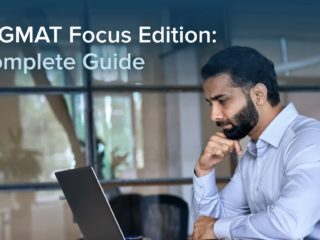Last Updated on August 16, 2023
Since the new GMAT Focus Edition was announced, people have been wondering how the Focus Edition compares with the classic GMAT. One question often asked is, “Is the GMAT Focus Edition harder?”
Information from the Graduate Management Admission Council (GMAC) helps to answer that question, and the answer may surprise you. So, in this article, I’m going to discuss what that information indicates about the difficulty of the GMAT Focus Edition. We’ll see whether the GMAT Focus Edition is easier or harder than the classic GMAT and discuss what the answer means for MBA aspirants.
Here are the topics we’ll cover:
- Is the GMAT Focus Edition Easier to Prepare For?
- What GMAT Focus Edition Score Percentiles Indicate About the Difficulty
- How the Difficulty Level of the GMAT Focus Edition Will Affect Test-Takers
- What Is the Difference Between the GMAT Focus Edition and the Standard Edition?
- Which Is the Hardest Section in the GMAT Focus Edition?
- In Conclusion: Is the GMAT Focus Edition Easier or Harder Than the Classic GMAT?
- What’s Next?
Let’s begin by discussing whether the GMAT Focus Edition is easier to prepare for than the classic GMAT.
Is the GMAT Focus Edition Easier to Prepare For?
One big difference between the GMAT Focus Edition and the classic GMAT is that the GMAT Focus Edition does not include Geometry or Sentence Correction.
Geometry comprises a significant portion of the Quant section of the classic GMAT. Also, many GMAT test-takers find Geometry one of the more challenging aspects of GMAT Quant. So, the omission of Geometry should make the Focus Edition easier to prepare for than the classic GMAT.
In addition, Sentence Correction has been a part of the GMAT for which people often did a lot of preparation. So, the omission of Sentence Correction from the GMAT Focus Edition clearly makes preparing for the GMAT less onerous.
Furthermore, the Focus Edition doesn’t include the Analytical Writing essay section that’s included in the current GMAT. Though GMAT students typically don’t prepare much for the AWA, the elimination of the AWA can only make the Focus Edition easier to prepare for.
GMAC itself has touted the new GMAT Focus Edition as involving “less content to prepare.” So, our first impression is that the Focus Edition is significantly easier to prepare for than the classic GMAT.
However, the story is not that simple, because of Data Insights.
Data Insights: More Important Than Integrated Reasoning
Offsetting the removal of Geometry and Sentence Correction from the GMAT is the fact that test-takers’ performance on Data Insights will affect their GMAT total scores. Data Insights is basically Integrated Reasoning in a new form, and many GMAT students didn’t prepare much for the Integrated Reasoning section. So, the fact that Data Insights affects the total score means that GMAT students will have to prepare seriously for the section, and thus adds to the amount of preparation necessary for the GMAT.
Thus, the additional prep for Data Insights somewhat offsets the elimination of prep for Geometry, Sentence Correction, and the AWA. Still, overall, it seems clear that the GMAT Focus Edition involves less preparation than the standard GMAT.
KEY FACT:
Because the GMAT Focus Edition does not include Geometry or Sentence Correction, it involves less to prepare for than the current GMAT.
However, will people really prepare less, and is the GMAT Focus Edition easier than the standard GMAT? GMAC has released expected GMAT Focus Edition Score percentiles, and they help to answer those questions. Let’s discuss.
What GMAT Focus Edition Score Percentiles Indicate About the Difficulty
GMAC has released predicted score percentiles for the Quantitative, Verbal, Data Insights, and total scores for the GMAT Focus Edition. We can get a sense of how the difficulties of the Focus Edition and the classic GMAT compare by comparing these predicted Focus Edition Percentiles with classic GMAT percentiles.
Let’s start with the Verbal section.
Verbal Score Percentiles Comparison
In the table below are some classic GMAT Verbal scores and GMAT Focus Edition Verbal scores, along with their percentiles.
| Classic GMAT Verbal Score | Percentile | GMAT Focus Verbal Score | Percentile |
|---|---|---|---|
| 51 | 99 | 90 | 100 |
| 50 | 99 | 89 | 100 |
| 49 | 99 | 88 | 99 |
| 48 | 99 | 87 | 99 |
| 47 | 99 | 86 | 98 |
| 46 | 99 | 85 | 96 |
| 45 | 99 | 84 | 91 |
| 44 | 98 | 83 | 86 |
| 43 | 98 | 82 | 79 |
| 42 | 96 | 81 | 70 |
| 41 | 93 | 80 | 60 |
| 40 | 90 | 79 | 51 |
| 39 | 88 | 78 | 42 |
| 38 | 84 | 77 | 33 |
| 37 | 81 | 76 | 25 |
Looking at the two sets of percentiles, we see that they start off fairly similar. We can consider the 100th percentiles of the top two GMAT Focus Edition Verbal scores basically equivalent to the top two 99th percentiles of classic GMAT Verbal scores. So, the top four Verbal scores on the two exam variations have basically the same percentiles.
However, as we go down the scales, the percentiles associated with GMAT Focus Edition Verbal scores decline much faster than the classic GMAT Verbal percentiles. In fact, by the time we get halfway down the GMAT Focus Edition Verbal score scale to 76, we are at the 25th percentile. In contrast, the classic GMAT mid-range Verbal score of 28 (not shown) is associated with the 49th percentile.
This information means that GMAC expects 75 percent of test-takers to score at or above the mid-range Verbal score on the GMAT Focus Edition. In contrast, on the classic GMAT exam, only 51 percent of test-takers score at or above the mid-range Verbal score. Apparently, GMAC expects the GMAT Focus Edition Verbal section to be easier than the classic GMAT Verbal section.
So, given the reduction in content to learn for the Focus Edition and the apparently easier Verbal section, so far, the GMAT Focus Edition seems easier than the classic GMAT. However, we’re not done yet.
KEY FACT:
Predicted GMAT Focus Verbal score percentiles indicate that GMAT Focus Verbal is easier than classic GMAT Verbal.
Let’s now do a similar comparison of Integrated Reasoning and Data Insights Score Percentiles.
Integrated Reasoning and Data Insights Score Percentiles Comparison
In the table below are classic GMAT Integrated Reasoning scores and some GMAT Focus Edition Data Insights scores, along with their percentiles.
| Classic GMAT Integrated Reasoning Score | Percentile | GMAT Focus Data Insights Score | Percentile |
|---|---|---|---|
| 8 | 90 | 90 | 100 |
| 7 | 79 | 89 | 100 |
| 6 | 64 | 88 | 99 |
| 5 | 47 | 87 | 99 |
| 4 | 31 | 86 | 99 |
| 3 | 17 | 85 | 99 |
| 2 | 8 | 84 | 98 |
| 1 | 0 | 83 | 96 |
| – | – | 82 | 94 |
| – | – | 81 | 90 |
| – | – | 80 | 86 |
| – | – | 79 | 79 |
| – | – | 78 | 73 |
| – | – | 77 | 66 |
| – | – | 76 | 58 |
Looking at the two sets of percentiles, we see that they are quite different. The fact that 8 is a 90th percentile Integrated Reasoning score contrasts significantly with what we see on the Data Insights side. Around one eighth of the way down the Data Insights score scale is 87, which is a 99th percentile score. So, whereas about 10 percent of test-takers score in the top eighth of the Integrated Reasoning score scale, GMAC expects only 1 percent of test-takers to score in the top eighth of the Data Insights score scale.
The Data Insights percentiles continue to decline more slowly than Integrated Reasoning percentiles as we go down the scale. Halfway down the Integrated Reasoning score scale, at 5, the percentile is 47. Halfway down the Data Insights score scale at 75, the percentile is 58. So, GMAC expects only 42 percent of test-takers to score above the midpoint score for Data Insights, whereas 53 percent score above the midpoint on Integrated Reasoning.
Apparently, in contrast to what we saw about the Verbal section, GMAC expects the Data Insights section to be harder than Integrated Reasoning.
KEY FACT:
Predicted Data Insights score percentiles indicate that GMAT Focus Data Insights is harder than classic GMAT Integrated Reasoning.
The story becomes even more interesting when we consider the Quant sections of the two exams.
Quant Score Percentiles Comparison
In the table below are some classic GMAT Quant scores and GMAT Focus Edition Quant scores, along with their percentiles.
| Classic GMAT Quant Score | Percentile | GMAT Focus Quant Score | Percentile |
|---|---|---|---|
| 51 | 97 | 90 | 100 |
| 50 | 87 | 89 | 97 |
| 49 | 73 | 88 | 95 |
| 48 | 65 | 87 | 94 |
| 47 | 57 | 86 | 92 |
| 46 | 53 | 85 | 89 |
| 45 | 50 | 84 | 85 |
| 44 | 44 | 83 | 81 |
| 43 | 41 | 82 | 76 |
| 42 | 36 | 81 | 71 |
| 41 | 34 | 80 | 66 |
| 40 | 32 | 79 | 59 |
| 39 | 28 | 78 | 52 |
| 38 | 27 | 77 | 46 |
| 37 | 25 | 76 | 40 |
In this case, the difference between the percentiles is greater than the difference we saw between the Verbal percentiles or between the Integrated Reasoning and Data Insights percentiles.
At the tops of the Quant score ranges, we see a big difference. Over 10 percent of test-takers achieve the top two classic GMAT Quant scores of 51 and 50. However, only 3 percent are expected to achieve the Focus Edition top two Quant scores of 90 and 89.
And the difference continues as we go down the scale. Looking at the bottom row of the table, we see that halfway down the Focus Edition Quant score range, 76 is a 40th percentile score. Contrast that with the percentile of the mid-range classic GMAT Quant score of 28 (not shown), which is associated with the 11th percentile!
That means that, on the classic GMAT, nearly 90 percent of test-takers score in the top half of the Quant score range. In contrast, GMAC expects a much lower 60 percent of test-takers to score in the top half of the Quant score range on the Focus Edition. Clearly, the Quant section of the Focus Edition is harder than the Quant section of the current GMAT.
KEY FACT:
Predicted GMAT Focus Quant score percentiles indicate that GMAT Focus Quant is harder than classic GMAT Quant.
And the difference doesn’t end there. Let’s now look at the final piece of the story: GMAT total score percentiles.
GMAT Total Score Percentiles Comparison
In the table below are some classic GMAT total scores and GMAT Focus Edition total scores, along with their percentiles.
| Classic GMAT Total Score | Percentile | GMAT Focus Total Score | Percentile |
|---|---|---|---|
| 800 | 100 | 805 | 100 |
| 790 | 99 | 795 | 100 |
| 780 | 99 | 785 | 100 |
| 770 | 99 | 775 | 100 |
| 760 | 99 | 765 | 100 |
| 750 | 98 | 755 | 100 |
| 740 | 97 | 745 | 100 |
| 730 | 96 | 735 | 100 |
| 720 | 94 | 725 | 99 |
| 710 | 90 | 715 | 99 |
| 700 | 87 | 705 | 99 |
| 690 | 84 | 695 | 98 |
| 680 | 80 | 685 | 97 |
| 670 | 78 | 675 | 96 |
| 660 | 74 | 665 | 94 |
The difference in this case is huge. Look at the difference between the percentiles of 700 on the classic GMAT and 705 on the GMAT Focus Edition. 700 on the classic GMAT is an 87th percentile score. So, about 13 percent of classic GMAT scores are above 700. Contrast that with the percentile of 705 on the Focus Edition, 99th. So, GMAC expects a mere 1 percent of Focus Edition Scores to be above 700.
Meanwhile 735 on the Focus Edition is expected to be a 100th percentile score. In other words, the difficulty of scoring 735 on the Focus Edition is expected to be similar to that of scoring a perfect 800 on the current GMAT. Clearly, GMAC believes that the Focus Edition is a harder test overall.
KEY FACT:
The fact that GMAC predicts that only 1 percent of test-takers will score above 700 on the GMAT Focus Edition indicates that the GMAT Focus Edition is harder overall than the classic GMAT.
So, what does all this mean for test-takers?
How the Difficulty Level of the GMAT Focus Edition Will Affect Test-Takers
We’ve seen that the GMAT Focus Edition involves less content to prepare for than the classic GMAT. On the other hand, the Focus Edition will be a more difficult test. So, will the Focus Edition end up being less or more challenging to handle than the current GMAT?
Here’s the thing. Ultimately, what makes the GMAT challenging is competition among applicants to MBA programs. It’s MBA applicants who drive up average GMAT scores and challenge each other to score ever-higher on the test. So, if applicants accept Focus Edition scores that are lower than classic GMAT scores, then preparing for the GMAT may become easier.
However, it’s quite possible that business school applicants will continue to push GMAT scores higher. After all, why stop at scoring, for instance, a 94th percentile 665 on the Focus Edition when there are 14 possible scores above 665? In that case, while there is less content to learn for the Focus Edition, GMAT prep times may increase back to where they are now.
So, how this story will play out remains to be seen.
KEY FACT:
Ultimately, how much preparation will be necessary for achieving a competitive GMAT Focus Edition score depends on how much MBA applicants push up GMAT scores.
Let’s now answer some common questions about the GMAT Focus Edition.
What Is the Difference Between the GMAT Focus Edition and the Standard Edition?
The biggest test format differences between the GMAT Focus Edition and the standard edition of the GMAT are the following:
- The GMAT Focus Edition has three sections: Data Insights, Quantitative, and Verbal. In contrast, the standard edition has four sections: Analytical Writing Assessment (AWA), Integrated Reasoning, Quantitative, and Verbal.
- The Quantitative section of the GMAT Focus Edition does not include Geometry, unlike the Quantitative section of the standard GMAT.
- On the GMAT Focus Edition, the Data Sufficiency questions are in the Data Insights section. On the standard edition, Quantitative Problem Solving and Data Sufficiency are both in the Quant section.
- The Verbal section of the GMAT Focus Edition does not include Sentence Correction, unlike the standard GMAT Verbal section.
- The GMAT Focus Edition is 2 hours and 15 minutes long, not including breaks. The standard version is 3 hours and 7 minutes long, not including breaks.
Beyond those differences are some others that are not as major but still significant, such as differences in score reporting. You can learn about all of the differences from our complete guide to the GMAT Focus Edition.
Which Is the Hardest Section in the GMAT Focus Edition?
Which section of the GMAT Focus Edition is hardest will vary from test-taker to test-taker. Some GMAT test-takers find the Quant section the hardest. For others, Quant is easy and Verbal is more challenging. Some people have the most trouble with Data Insights question types.
Let’s now wrap up with a summary of what we’ve discussed.
In Conclusion: Is the GMAT Focus Edition Easier or Harder Than the Classic GMAT?
Here is what we’ve seen in comparing the difficulties of the GMAT Focus Edition and the classic GMAT.
- No Sentence Correction, Geometry, or AWA on the GMAT Focus Edition means less content GMAT students need to study.
- Predicted score percentiles released by GMAC indicate that the Verbal section of the GMAT Focus Edition is easier than the Verbal Section of the classic GMAT.
- Predicted Data Insights score percentiles indicate that Data Insights on the GMAT Focus Edition is harder than Integrated Reasoning on the classic GMAT.
- The predicted Quant section score percentiles released by GMAC indicate that GMAT Focus Edition Quant is significantly harder than classic GMAT Quant.
- Predicted GMAT total score percentiles indicate that, overall, the GMAT Focus Edition is harder than the classic GMAT.
What’s Next?
To learn about the Data Insights section of the GMAT Focus Edition, you can read our complete guide to Data Insights.
If you want to know how to master the Quant section of the GMAT, check out these top 10 GMAT Quant tips.
For insights that could turbocharge your GMAT Verbal prep, see our post on how to score high on GMAT Verbal.



